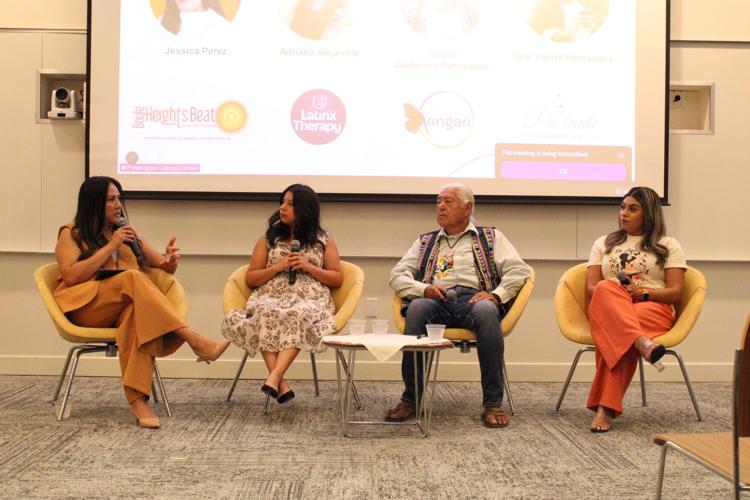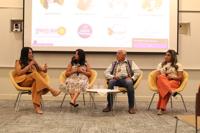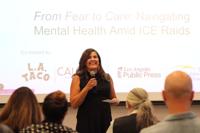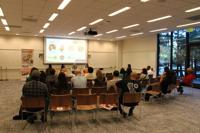
(Left to right) Jessica Perez, Adriana Alejandre, Guillermo Ruiz Hernandez (Tata G) and Dr. Yanira Hernandez. Photo by Luis Cano, Boyle Heights Beat
Navigating mental health, immigration raids and community care were some of the themes of Wednesday’s event “From Fear to Care,” a panel hosted by the Boyle Heights Beat and the Los Angeles Local News Initiative, in partnership with L.A. Taco, Los Angeles Public Press and CALÓ News.
As Michele Siqueiros, founding chief executive officer at L.A. Local News Initiative, explained to attendees, the event was a direct response to community needs and demands for mental health resources and support that were expressed in a community survey conducted by the news organization.
“Our most important job is to listen to the community and to respond directly to the community's needs and this event is a result of that listening,” Siquieros said. “We are hosting it because the community asked for more mental health and wellness resources.”
The community-inspired event was hosted both in person and via Zoom, with more than 120 online attendees at one point and was a direct response to the growing Immigration and Customs Enforcement (ICE) raids that have impacted local communities in L.A. and throughout Southern California.
Moderated by Boyle Heights Beat editor Jessica Perez, the panel featured trauma-informed therapists and cultural healers who unpacked the health toll of these events on families, frontline responders and allies.

Michele Siqueiros, founding chief executive officer at L.A. Local News Initiative. Photo by Luis Cano, Boyle Heights Beat
The panelists included Adriana Alejandre, a trauma therapist and founder of Latinx Therapy, a directory connecting Latinx therapists with those in search of culturally oriented therapy services; Dr. Yanira Hernandez, a licensed clinical social worker and founder of Pa’lante Therapy, which provides trauma-informed and non-colonial healing in English and Spanish; and Guillermo Ruiz Hernandez (Tata G), a P’urhépecha elder and founder of the Xangari Institute, a healing space rooted in Indigenous knowledge for BIPOC communities.
“We surveyed hundreds of neighborhood residents and 50% of them told us that the ICE raids were impacting their mental health and their well-being, and about a third of them told us that the resource they needed the most was mental health support,” Perez said.
Hernandez, who works with first-generation individuals, children of immigrants, DACA recipients and undocumented, mixed-status families, said that in the last few months, what she has seen and felt the most is hypervigilance among the different communities.
“One of the things that I'm seeing is a lot of post-traumatic stress disorder-like symptoms and hypervigilance has been very prominent right now,” she said.
She explained that for many immigrants, PTSD symptoms can be stored in one's body for years and with the raids, they can resurface. “Even for myself, too, I see a white van and I notice my body automatically freezes, you know. For many of us, especially our parents, our families and our ancestors who have perhaps experienced violence in their homelands, they're noticing that retraumatization is happening again,” Hernandez said.
The importance of community, solidarity and love has also been one of the key components of the immigrant experience, especially in L.A. where mutual aid groups, community defense collectives and community patrols have defended and looked out for the undocumented community by documenting ICE sightings and providing free food distribution, know-your-rights trainings and grocery delivery, among other resources.

The community-inspired event was hosted both in person and via Zoom, with more than 120 online attendees at one point. Photo by Luis Cano, Boyle Heights Beat
“I think the sense of community and leaning on each other is something that has been so beautiful to see. That connection alone created community,” she said.
Tata G touched on the importance of connecting not only with community members but also with oneself. “Every single individual who is right here … you are a warrior because you are coming from a beautiful family who were real guerreros,” he said. “Part of this is you need to reconnect to the wisdom that you carry inside you.”
He also recognized that asking for help and actively seeking community can be harder for men who are socially conditioned to isolate and refrain from vulnerable conversations. “A little more than 30 years ago, we developed the National Compadres Network. We provide trainees educational opportunities around the globe, and the whole idea of the network is to develop circles where men can come together,” he said, adding that the network hosts monthly gatherings in places like Compton, San Fernando Valley and other places in Southern California.
The event also highlighted the importance of citizens and individuals with status participating and supporting the undocumented community to the best of their ability. “ I tend to teach folks to be comfortable with expressing how they'd like to be supported. I really like to invite people to just say, ‘How can I support you best right now throughout this? Do you need an ear? Do you need resources or problem-solving?’ That allows for that connection to be a little bit more intentional,” Alejandre said.
Hernandez also advised those with citizenship and U.S.-born individuals to check in on their own privileges and the capacity to be an ally, in different ways, to the immigrant communities. “For those who may hold a privileged identity, ask yourself, ‘How can I leverage this privileged identity to be of support to the community?’ And it could be that maybe you feel all empowered to stand up to an ICE agent, or it could also just be doing a market run,” she said.














(0) comments
Welcome to the discussion.
Log In
Keep it Clean. Please avoid obscene, vulgar, lewd, racist or sexually-oriented language.
PLEASE TURN OFF YOUR CAPS LOCK.
Don't Threaten. Threats of harming another person will not be tolerated.
Be Truthful. Don't knowingly lie about anyone or anything.
Be Nice. No racism, sexism or any sort of -ism that is degrading to another person.
Be Proactive. Use the 'Report' link on each comment to let us know of abusive posts.
Share with Us. We'd love to hear eyewitness accounts, the history behind an article.